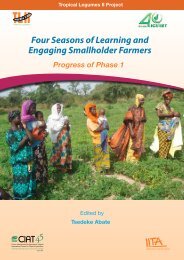Four Seasons of Learning and Engaging Smallholder Farmers - icrisat
Four Seasons of Learning and Engaging Smallholder Farmers - icrisat
Four Seasons of Learning and Engaging Smallholder Farmers - icrisat
You also want an ePaper? Increase the reach of your titles
YUMPU automatically turns print PDFs into web optimized ePapers that Google loves.
Pigeonpea Breeding <strong>and</strong> Seed Systems in<br />
India<br />
KB Saxena, MG Mula ( ICRISAT-Patancheru, India); AN Patil( PDKV-Akola, Maharashtra, India); CV<br />
Sameer Kumar ( ANGRAU, Hyderabad, Andhra Pradesh, India)<br />
Breeding<br />
Summary<br />
The activities for pigeonpea were carried out in Maharashtra (Akola <strong>and</strong> Washim districts) <strong>and</strong> Andrha<br />
Pradesh (Ranga Reddy district) with active participation <strong>of</strong> the KrishiVigyan Kendra (KVK) Durgapur<br />
taluk, Murtizapur <strong>and</strong> Karda taluk Risod (Maharashtra) <strong>and</strong> Agricultural Research Station (ARS) <strong>of</strong><br />
Acharya N.G. Ranga Agricultural University (ANGRAU), Andhra Pradesh (AP). The villages were<br />
selected in consultation with program coordinators. Progressive farmers from the selected villages<br />
were identified for conducting <strong>of</strong> mother <strong>and</strong> baby trials <strong>of</strong> farmers participatory varietal selection<br />
trials (PVS). Preferred traits <strong>of</strong> pigeonpea were selected with emphasis on wilt resistant, medium bold<br />
size, red-seeded <strong>and</strong> suitability <strong>of</strong> variety for intercropping with crops like soybean, cotton, mung <strong>and</strong><br />
urd beans. The preference <strong>of</strong> the improved varieties varied from village to village, depending on soil<br />
type, cropping system <strong>and</strong> existing disease problem (wilt, sterility mosaic disease). In project villages<br />
(Maharashtra), the dem<strong>and</strong> <strong>of</strong> PKV-TARA, BSMR-736, BDN-708 <strong>and</strong> Vipula was more as compared to<br />
other varieties. ICPH 2671, although having higher yield, was relatively less preferred by farmers due<br />
to the dark color <strong>of</strong> the seed. In AP, the farmers preferred varieties due to their resistance to wilt/sterility<br />
mosaic diseases <strong>and</strong> higher yields such as Asha, PRG 158 <strong>and</strong> ICPH 2671.<br />
PVS trials<br />
During the three year period <strong>of</strong> the project, a total <strong>of</strong> 10 mother trials <strong>and</strong> 107 baby trials were<br />
conducted. In Maharashtra, six mother trials <strong>and</strong> 91 baby trials were implemented in 15 villages <strong>of</strong><br />
Akola <strong>and</strong> Washim districts, while in AP, 16 baby trials <strong>and</strong> four mother trials were conducted in 16<br />
villages <strong>of</strong> Ranga Reddy <strong>and</strong> Mahaboobnagar districts. Varieties tested were Asha, Maruti, Lakshmi,<br />
LRG 41, PRG 158 <strong>and</strong> ICPH-2671 with NallaK<strong>and</strong>i as local check for AP while in Maharashtra, PKV<br />
TrombayTur, AKT-8811, ICPH 2671, BSMR-853, BDN-708, <strong>and</strong> Vipula.<br />
The overall assessment <strong>of</strong> the mother <strong>and</strong> baby trials in Maharashtra revealed that ICPH 2671 (hybrid)<br />
performed best with yield <strong>of</strong> 2.8 MT/ha, followed by PKV TrombayTur (1.9-2.0 MT/ha), BDN 708 (1.6-<br />
1.8 MT/ha), AKT 8811 <strong>and</strong> Vipula (1.2-1.5 MT/ha) <strong>and</strong> BSMR 853 (1.3-1.4 MT/ha). In AP, Asha, ICPH<br />
2671 were the preferred varieties.<br />
Mother trials<br />
In Maharashtra, the mother trials were conducted under an intercropping system in rain-fed conditions.<br />
A total <strong>of</strong> six trials (2 in each district <strong>and</strong> 1 trial at each <strong>of</strong> the KVK) were conducted. Out <strong>of</strong> the five<br />
locations Maruti ranked first in four villages as preference given by the farmers at the time <strong>of</strong> field<br />
days/on-farm training. In village Shelu-khadase PKV Tara variety is preferred. Moreover, the overall<br />
assessment shows that PKV Tara/Vipula st<strong>and</strong> second in preference (Table 9-1). In AP, Kodangal <strong>and</strong><br />
Basheerabad farmers preferred Asha <strong>and</strong> ICPH 2671 among the other varieties (Table 9-2).<br />
Progress <strong>of</strong> Phase 1<br />
191

















